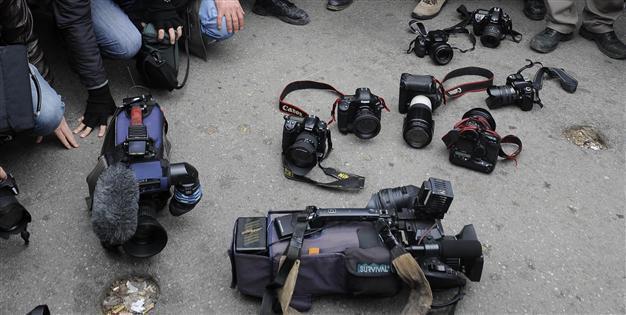Turkey climbs in global press freedom index, but warned about poor record
ISTANBUL

Turkey has ranked 149th out of 180 countries in Reporters Without Borders’ world press freedom index, climbing five places in one year due to the release of a number of journalists, despite mounting criticism against the government’s approach to freedom of expression and the media.
This year, Turkey ranked just above Democratic Republic of the Congo, Gambia and Russia, but lagged behind Mexico, Burundi and Bangladesh – along with 145 other countries, according to the organization’s annual World Press Freedom Index released on Feb. 12.
This is the first progress Turkey has recorded in the index since 2005, when it jumped 15 places to rank 98th.
Despite posting modest progress in its overall score, Turkey’s underlying score – which measures main parameters like pluralism, media independence, environment and self-censorship, legislative framework, transparency and infrastructure – still declined.
“Turkey’s ‘underlying situation’ score, covering such areas as cyber-censorship, lawsuits, dismissals of critical journalists and gag orders, actually worsened, showing that freedom of information continues to decline,” Reporters Without Borders said.
Turkey managed to climb in the ranks thanks to the conditional release of around 40 imprisoned journalists, the organization said in its note about the country, but added that these journalists “continue to face prosecution and could be detained again at any time.”
The report particularly mentioned the government’s moves against media groups linked to U.S.-based Muslim cleric Fethullah Gülen, who has in recent years gone from being President Recep Tayyip Erdoğan’s close ally to his arch foe.
“Rocked by major corruption allegations, the government has done everything possible to rein in the influence of its new Public Enemy No. 1, the Gülen Movement, to the increasing detriment of the rule of law,” the note read.
Police arrested over two dozen people on Dec. 14, including the editor-in-chief of daily Zaman and other media figures, in lightning raids on outlets with known links to Gülen.
The Turkish government crackdown on media drew huge international reaction from some of the world’s leading organizations, even sparking wars of words between the government and the European Union, as well as members of the United States Congress.
The high number of detained journalists in Turkey has already been a source of concern for human rights groups and international organizations for years, despite the government’s insistence that the jailed reporters are charged with crimes not related to their jobs.
Turkey also attracted international criticism when it temporarily banned access to Twitter and YouTube last year, over leaks on links to graft allegations against government officials, including President Recep Tayyip Erdoğan. That crackdown followed 2013’s Gezi Park protests, during which many users were detained because of their posts in support of demonstrators.
Regarding global developments, Reporters Without Borders said in its annual evaluation that media freedom had suffered a “drastic decline” worldwide last year, in part because of extremist groups and raging conflicts.
The index stated that there were 3,719 violations of freedom of information in 180 countries in 2014 – eight percent more than a year earlier.
All parties in conflicts raging in the Middle East and Ukraine were waging “a fearsome information war” where media personnel were directly targeted to be killed, captured or pressured to relay propaganda, it added.
 Turkey has ranked 149th out of 180 countries in Reporters Without Borders’ world press freedom index, climbing five places in one year due to the release of a number of journalists, despite mounting criticism against the government’s approach to freedom of expression and the media.
Turkey has ranked 149th out of 180 countries in Reporters Without Borders’ world press freedom index, climbing five places in one year due to the release of a number of journalists, despite mounting criticism against the government’s approach to freedom of expression and the media.